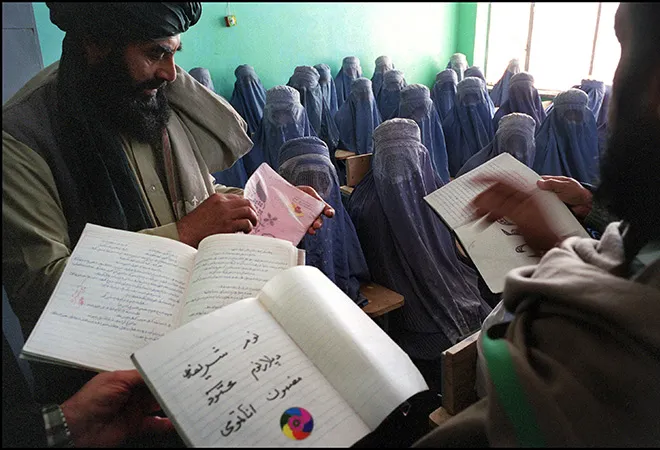
The Taliban’s capture of Kabul in late August 2021, and subsequent consolidation of rule over Afghanistan, raised serious concern that the gains secured by women and girls over the last 20 years would be lost. Since regaining control of Afghanistan, Taliban representatives have promised to respect women’s rights to work and education, albeit within an ill-defined Islamic framework. But the government’s actions over the past few months strongly suggest that the Islamic fundamentalist group is reverting to form when it comes to using power to oppress women and girls.
Since resuming control, Taliban authorities have severely restricted where women and girls can go in their community.
According to Amnesty International, women have been informed that they cannot go to work or travel without a male guardian. For the last three months, girls over the age of 12 have been prohibited from attending school, and segregation of women and men in universities is negatively impacting women’s opportunities in post-secondary institutions. Women have been expelled from many areas of the labour force, including the media and entertainment fields. In October, UN Secretary-General Antonio Guterres
slammed the Taliban for breaking its commitments to women and girls in Afghanistan.
According to Amnesty International, women have been informed that they cannot go to work or travel without a male guardian.
The Taliban has forced the closure of domestic abuse shelters, leaving survivors without critical assistance and protection. According to
Amnesty International, “many survivors—as well as shelter staff, lawyers, judges, government officials, and others involved in protective services— are now at risk of violence and death.” Earlier this month, Taliban soldiers
shot and killed the 10 year-old daughter of an Afghan man who had worked for the Canadian Armed Forces in Kandahar, as well as an adult woman related to the girl.
The government’s Ministry of Women Affairs has been replaced by a Ministry for Propagation of Virtue and Prevention of Vice, and women have been expunged from the Cabinet.
Under previous Taliban rule, the “
virtue-promoting ministry” beat women for failing to cover all of their body with clothing, including wrists and ankles, and for walking outside without a close male relative. Women increasingly fear for their personal safety.
Taliban soldiers shot and killed the 10 year-old daughter of an Afghan man who had worked for the Canadian Armed Forces in Kandahar, as well as an adult woman related to the girl.
To gain further insights into the troubling situation, RIWI, a Toronto-based global data collection firm, launched a study
<1> gathering real-time sentiment data from individuals in Afghanistan, safely and anonymously. RIWI used
Random Domain Intercept Technology to gather insights from more than 12,000 people over the age of 15 between 27 August and 1 November 2021. The technology ensures that anyone surfing the internet has a chance of being exposed to the survey, regardless of device type. More than 7 million people in Afghanistan have access to the internet.
More than two-fifth of the survey respondents with school-aged female family members reported that those family members were not attending school. Of those, 41 percent reported that girls/women were not allowed to attend school in their area, and an additional 29 percent reported that girls/women were allowed in school, but that it was unsafe for them to attend. The risk of child marriage, common in rural areas of the country before the Taliban regained power, is growing as teenage girls are prevented from attending school.
Over 60 percent of the respondents reported that women were not able to work safely in their areas, with 63 percent of those believing that it would remain unsafe for the foreseeable future (see below).
The risk of child marriage, common in rural areas of the country before the Taliban regained power, is growing as teenage girls are prevented from attending school.
RIWI’s survey data reinforce the accounts provided by Afghan residents and refugees alike that reveal an increasingly hostile environment for women and girls. The dismantling of their rights and denial of opportunities is occurring within the context of a full-blown humanitarian crisis—a crisis which disproportionately impacts the female population.
Nearly half the Afghan population is suffering from
acute food insecurity, and the situation is worsening as winter envelopes the mountainous nation. Poverty is driving destitute families to marry off their girls at young ages. An alarming seven in ten RIWI survey respondents said their lives are at risk due to the Taliban, and more than half reported that they had left their homes or attempted to do so due to Taliban actions.
The findings of this survey make vividly clear that without a much more robust response from the international community, conditions in Afghanistan will become even more dire, with girls and women the ones with most to lose. The United States, Canada, and their allies must urgently increase humanitarian assistance, prevent collapse of the country’s teetering banking system, and continually press Taliban leaders to protect the basic rights of its population—including the right of girls and women to receive an education and participate in the labour market and civic life.
Bart W. Édes is Professor of Practice at McGill University’s Institute for the Study of Development, and Distinguished Fellow at the Asia Pacific Foundation of Canada. Danielle Goldfarb, Head of Global Research, RIWI, provided survey data cited in this article.
<1> An average of 183 respondents chose to participate per day. Respondents were reached from across all of Afghanistan’s 34 provinces. The number of respondents per survey question ranged from 721 to 12,204.
The views expressed above belong to the author(s). ORF research and analyses now available on Telegram! Click here to access our curated content — blogs, longforms and interviews.



 The Taliban’s capture of Kabul in late August 2021, and subsequent consolidation of rule over Afghanistan, raised serious concern that the gains secured by women and girls over the last 20 years would be lost. Since regaining control of Afghanistan, Taliban representatives have promised to respect women’s rights to work and education, albeit within an ill-defined Islamic framework. But the government’s actions over the past few months strongly suggest that the Islamic fundamentalist group is reverting to form when it comes to using power to oppress women and girls.
Since resuming control, Taliban authorities have severely restricted where women and girls can go in their community.
The Taliban’s capture of Kabul in late August 2021, and subsequent consolidation of rule over Afghanistan, raised serious concern that the gains secured by women and girls over the last 20 years would be lost. Since regaining control of Afghanistan, Taliban representatives have promised to respect women’s rights to work and education, albeit within an ill-defined Islamic framework. But the government’s actions over the past few months strongly suggest that the Islamic fundamentalist group is reverting to form when it comes to using power to oppress women and girls.
Since resuming control, Taliban authorities have severely restricted where women and girls can go in their community.  PREV
PREV


